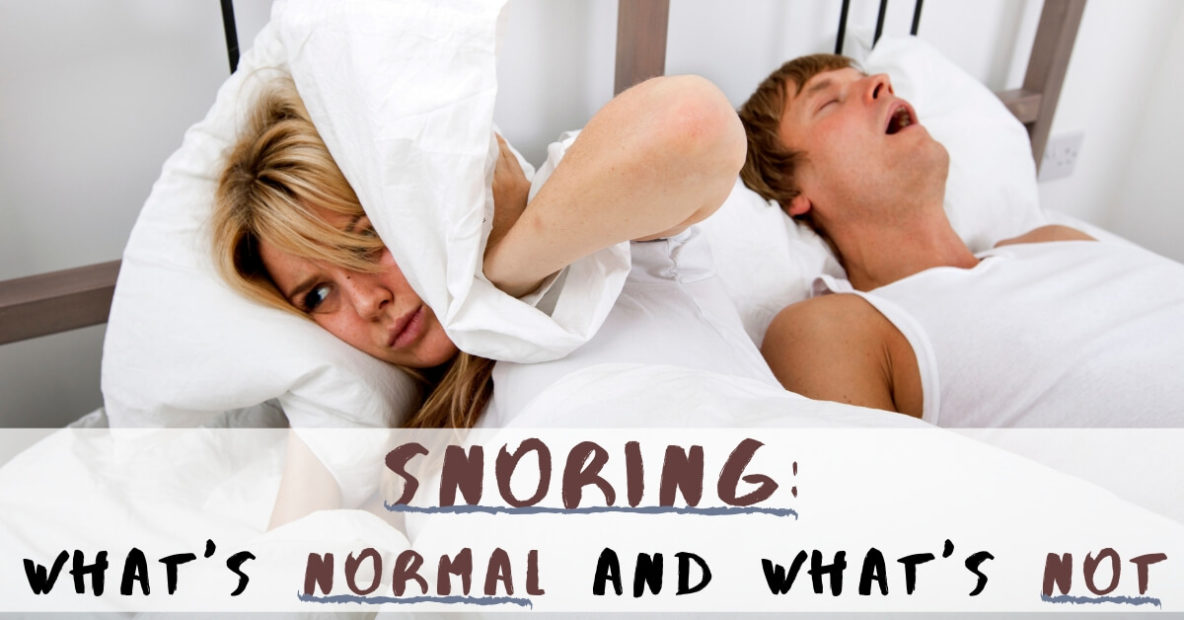Snoring: What’s Normal and What’s Not

- A Promising Paradigm Shift: New Research Challenges the CPAP-First Approach to OSA Treatment - September 5, 2023
- Understanding Sleep Meditation Techniques - July 30, 2021
- How Online Learning Has Affected Sleep for Students - July 13, 2021
Do you snore? Everyone snores from time to time, and if your snore infrequently it’s nothing to worry about. However, it’s estimated that around half of American adults snore regularly. This can disrupt your sleep, lead to daytime drowsiness, and make it difficult to focus on tasks. Snoring also affects your loved ones, and your partner will probably complain that you’ve kept them up at night, leading to tension in the relationship. What causes snoring, and what can you do about it?
What is Snoring?
While it’s true that snoring is very common, it’s not normal, and snoring often points to a bigger problem. If you snore every night it’s a sign that the air isn’t moving freely through your nose and throat, and you’re experiencing some amount of obstruction in your breathing pathways. This blockage causes the tissues around your nose and throat to vibrate, creating the snoring sound.
Snoring can be caused by a cold or flu, or seasonal allergies. If you’ve been wheezing or rattling in your sleep for a few nights, it’s probably not a big deal, and your airway is only temporarily clogged. If you’ve been snoring every night for a couple weeks or longer, it’s pointing to a much bigger issue, such as a blocked airway or obstructive sleep apnea. Age can be another factor in snoring, and older adults snore more often than younger adults because the throat muscles lose strength and tone as you age. Being out of shape can also leads to more snoring, and nasal and sinus problems can block your airways. Even your sleep posture has a big affect on your snoring.
Snoring and Cardiovascular Disease
Snoring can also be an early warning sign of other health conditions, such as cardiovascular disease. Researchers have found that those who snore, even if they don’t have a sleep disorder, are more at risk of experiencing a thickening in the carotid artery, which can lead to problems with the heart. When you snore, all the vibrations you feel through the night can cause an inflammation in the arteries, and this can lead to a thickening or hardening of the arteries that’s linked to various cardiovascular diseases.
Snoring and Obstructive Sleep Apnea
Obstructive sleep apnea is a common sleep disorder and breathing problem that affects millions of Americans, causing insomnia, fatigue, moodiness, irritability, a lack of concentration and focus, and even depression. Sleep apnea affects your airway when you sleep, and the muscles in the back of the throat relax and block your airway. Those with sleep apnea will actually stop breathing for a few seconds. When the brain notices that breathing has stopped, it will wake you up so the muscles tighten, opening the airway once again and allowing you to breath freely. This can happen many times in one night, and your partner will often complain that you snore loudly throughout the night. It will sound like ragged breathing, or even choking sounds, will stop abruptly, and then start again a few seconds later.
Sleep apnea is most common among middle aged adults, and being overweight, not getting enough exercise, or smoking can also increase your chances of developing sleep apnea. If you’ve been snoring consistently and you don’t have a cold or allergies, you might have sleep apnea. Don’t ignore your snoring, but get a sleep assessment and discover what treatment options are available to you.
Treating Sleep Disturbances
At Sound Sleep Medical, it’s our mission to help you sleep better. We’ll help you find out why you’re snoring, and find solutions to your breathing problems. It might be as simple as sleeping on your side or changing your pillow, and our team will help you determine the best treatment for your situation. If you have obstructive sleep apnea, the best treatment is to use a Continuous Positive Airway Pressure (CPAP) machine during the night. This machine pumps a small amount of air into your lungs, keeping your airway from collapsing as you relax, and allowing you to sleep deeply without snoring, struggling to breath, or waking up repeatedly throughout the night.
